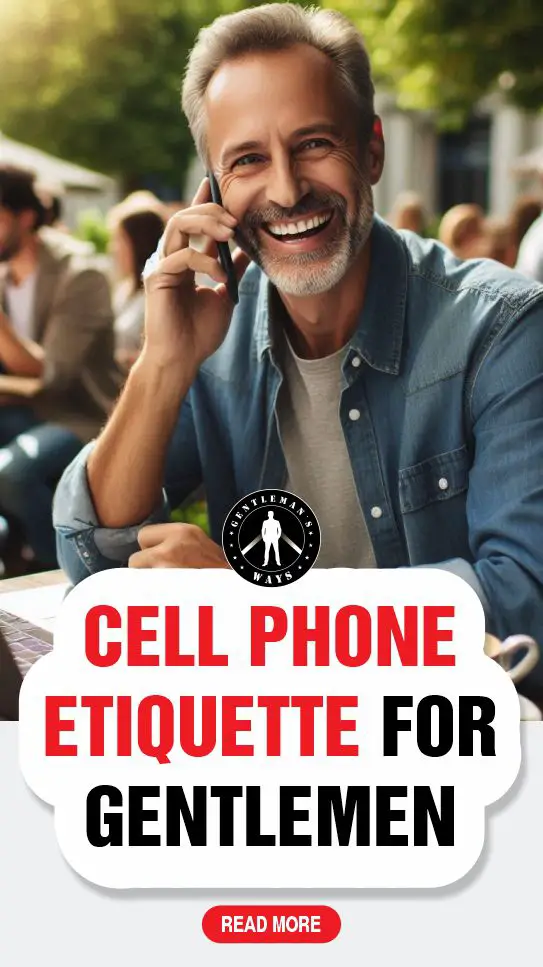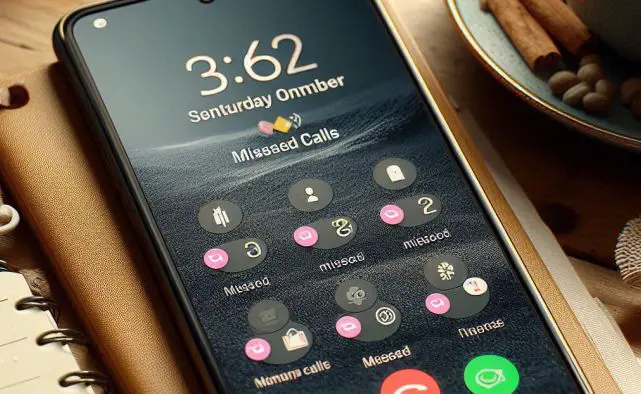Last updated on February 4th, 2025 at 06:53 pm
You use your phone daily, but do you handle calls, texts, and video chats like a true gentleman? Here is your cheat sheet for men’s telephone manners.
Phone Etiquette for men is one of the etiquette and manners men should take seriously. It is important to teach men how to be conscious about their phone habits.
Poor phone manners can damage personal and professional relationships.
Do you interrupt people, speak too loudly in public, or ignore messages? In today’s digital world, communication isn’t just about talking, it’s about timing, tone, and respect.
Whether you’re answering calls, texting colleagues, or joining video meetings, your phone etiquette shapes how others see you. Men who practice good telephone manners stand out.
Are you making the right impression?
This guide helps gentlemen communicate politely, respond appropriately, and avoid common mistakes that seem rude or careless.
Recommended: Professional and Business Etiquette Can Make or Break Your Career
You might want to pin the image below.

What is Phone Etiquette?
Phone etiquette is the set of polite behaviors men and gentlemen should follow when making calls, answering phones, texting, or using video chats. It includes speaking, respecting the time of others, and avoiding distractions during conversations.
Good telephone manners mean not interrupting, lowering your voice in public, and knowing when to text instead of call.
Professional phone courtesy is important for workplace communication, while social etiquette ensures respectful interactions with friends and family.
Recommended: Email Etiquette
The Importance of Cell Phone Etiquette for Gentlemen
Have you ever thought about how your phone habits shape the way others see you?
Good phone etiquette is more than being polite; it affects your relationships, reputation, and professional success.
The way you speak, listen and respond can either build trust or push people away.
Do you answer calls properly? Do you respect other people’s time? Every interaction matters whether it’s a quick text, a business call, or a conversation with a friend.
How Poor Phone Etiquette Hurts You
Bad cellphone manners can damage relationships, create misunderstandings, and cost you opportunities.
Speaking too loudly, interrupting, or texting at the wrong time appears rude. In professional settings, it makes you seem unprofessional; in personal interactions, it signals a lack of respect.
The Shift to Digital Communication
Without body language, phone conversations rely on tone and wording. A polite greeting, thoughtful timing, and active listening prevent miscommunication.
Texts should balance clarity and warmth, too short feels cold, and too long overwhelms.
Digital communication demands awareness to maintain strong connections in both personal and professional life.
Related: Understanding Digital Identity
Cell Phone Etiquette: Principles for Men in the Digital Age

I want to reiterate that your phone habits shape how others see you. Whether in business or personal life, the way you speak, text, and handle calls can build trust or create distance.
Good cellphone etiquette shows respect, improves conversations, and strengthens relationships.
Speak Clearly and Stay on Point
Mumbling or speaking too fast can confuse the person on the other end. Articulate your thoughts directly and understandably.
In professional settings, being concise keeps discussions productive.
A well-structured message prevents back-and-forth confusion in texts and calls.
Respect the Other Person’s Time
Before launching into a conversation, ask if the other person is available.
Unannounced calls at the wrong time can be disruptive. In texts, avoid sending long messages without context or expecting instant replies.
Time awareness makes communication smoother.
Related: Etiquette for Guys on Dating
Mind Your Tone and Language
Without facial expressions, your tone carries extra weight. A neutral or warm tone prevents misunderstandings.
Use polite words like “please” and “thank you.” Avoid sounding abrupt or dismissive, especially in business and professional calls.
Be Aware of Your Surroundings
Loud environments make conversations difficult. Find a quiet place before making or taking a call.
If you’re in public, lower your voice to avoid disturbing others. Keeping distractions to a minimum shows respect for both the caller and those around you.
Apply These Principles Daily
Good phone etiquette isn’t complicated, it’s about respect, clarity, and timing.
Are you leaving a good impression when you call, text, or answer the phone?
Being mindful of how you communicate can improve your personal and professional relationships in the digital age.
Related: How to Network Online
Answering Calls Professionally and Politely: Phone Courtesy

Why First Impressions Matter
Your first approach to a person on the phone matters a lot. The way you answer a call sets the tone for the entire conversation.
A polite and professional response shows respect and makes the caller feel valued.
Whether you’re speaking with a client, colleague, or friend, your approach can shape their perception of you.
Start with a Proper Greeting
Instead of just saying “Hello,” introduce yourself. A simple, “Hello, this is Chims, how can I help you?” acknowledges the caller and signals that you’re ready to engage.
This small effort makes conversations smoother and more professional.
Choose the Right Environment
Background noise can make you seem careless. If possible, take calls in a quiet space.
Avoid answering in noisy places where distractions can disrupt the conversation.
A focused environment ensures clear communication and keeps the caller’s attention on what matters.
Related: How to Travel Like a Gentleman
Speak Calmly and Listen Attentively
Rushing through greetings or sounding impatient can create a bad impression.
Keep your tone steady and warm. Let the caller speak without interruption, and respond thoughtfully.
Active listening helps build respect and keeps discussions productive.
Keep Calls Professional and Respectful
Even in casual conversations, maintaining a respectful tone is important. Avoid multitasking while on a call, it can make you seem distracted.
If you’re unable to talk, politely let the caller know and offer to call back at a better time.
Make Every Call Count
Every phone call is an opportunity to communicate effectively. A professional greeting, a quiet space, and attentive listening make all the difference.
Whether in business or personal life, good phone manners help you leave a lasting, positive impression.
Related: Eye Contact Etiquette
Speaking Clearly and Respectfully
When you’re on the phone, clarity is everything. Speaking ensures that the other person understands you without confusion.
This means articulating your words and choosing the right vocabulary based on the conversation’s context.
Whether in a business or casual chat, clear speech shows professionalism and respect.
Watch Your Pace and Volume
It’s important to speak at a moderate pace, not too fast, not too slow.
Speaking too quickly can make it hard for the listener to follow while speaking too slowly might come across as disengaged.
Aim for a steady flow that allows the other person to absorb what you’re saying.
Adjust your volume to be loud enough to hear clearly but not so loud that it feels overwhelming.
Avoid Slang and Fillers
Slang, “ums,” and “likes” can distract from your message and make you sound unprofessional.
Avoid mumbling as well, if you’re hard to hear or understand, you risk losing the listener’s attention.
Keep your speech clean and to the point for maximum impact.
Listen Actively and Respectfully
Effective communication is a two-way street. Active listening means being fully engaged in the conversation.
You can show you’re listening by summarizing key points or giving verbal nods like “I see” or “Got it.”
Avoid interrupting; let the other person speak their mind. This shows respect and keeps the conversation flowing smoothly.
Speak With Intent
Every phone conversation is an opportunity to communicate well. Speak clearly, avoid distractions, and show respect for the other person’s time and thoughts.
When you do, you’ll not only improve the conversation but also build stronger, more positive relationships.
Related: Gifting Gift Like a Gentleman
Respecting the Time of Others: Phone Courtesy
Start with a Clear Purpose
When making a call, be upfront about why you’re reaching out. A clear introduction helps the person on the other end know what to expect.
This keeps the conversation on track and prevents unnecessary tangents.
If the discussion strays, gently steer it back to the main points. Keeping your call focused shows respect for the other person’s time.
Watch for Cues to Wrap Up
Pay attention to the other person’s tone and body language, if video chatting.
If they seem distracted or rushed, ask if there’s anything else they want to discuss before ending the call.
This not only shows respect but also leaves the conversation open for future connections.
Avoid Unnecessary Small Talk
While it’s fine to connect with the person briefly, especially in professional settings, too much small talk can take away from the purpose of the call.
Focus on what’s important and avoid lengthy conversations that might waste both of your time.
Efficient Communication Makes a Difference
When you respect the other person’s time, you help maintain a positive, productive atmosphere.
By keeping calls brief and on topic, you show that you value their time, which can strengthen your professional relationships and lead to smoother, more efficient interactions.
Related: RSVP Etiquette
Handling Missed Calls and Voicemails

Return Missed Calls Promptly
When you miss a call, make sure to return it as soon as possible. Aim to do this within 24 hours to avoid misunderstandings or leaving the impression that the call wasn’t important.
If it’s a priority, return it immediately. For less urgent calls, waiting a day or two is okay.
Leave Clear and Concise Voicemails
When leaving a voicemail, make sure the message is clear and to the point.
Start by introducing yourself and the reason for your call, like “Hi, this is Clements, calling about our meeting on Friday.”
Follow with your key message and end with your contact info. For example, “You can reach me at so..so..so phone numbers.”
Set a Professional Voicemail Greeting
Your voicemail greeting should be polite and professional. Simply state your name, let the caller know you can’t take the call, and ask them to leave a message.
A greeting like, “This is Deacon. I’m unable to take your call right now, but drop a message and I’ll get back to you when I am disposed,” helps maintain professionalism.
Texting Etiquette for Men
When to Text and When to Call
Texting is great for quick updates, scheduling, or sharing straightforward information.
However, if the topic requires more depth or if there’s a chance of miscommunication, it’s better to pick up the phone.
A call lets you get instant feedback and avoids confusion.
Avoid Overusing Emojis and Abbreviations
Emojis and abbreviations can be fun, but they shouldn’t dominate your texts.
While a thumbs-up might be fine with friends, it can come across as unprofessional in a work-related conversation.
Keep it simple and clear, especially when texting colleagues or superiors.
Keep Messages Short and Focused
Before you send a text, ask yourself if it’s necessary. Avoid sending long, rambling messages.
Instead, stick to the point. Short and clear texts make your communication easier to understand and more effective.
Being Mindful in Public Spaces
Being considerate when using your phone in public makes your interactions more pleasant for everyone.
By being aware of your volume, avoiding speakerphone, and respecting personal space, you help create a more respectful and comfortable environment for all.
Watch Your Volume
When you’re talking on the phone in public, always be aware of your voice.
Loud conversations can disturb those around you, especially in quiet places like restaurants or public transport.
Lower your voice to respect others’ space and maintain a pleasant atmosphere.
Avoid Using Speakerphone
Using speakerphone in public areas can be disruptive. It turns a private conversation into a public one, drawing attention that no one asked for.
If you need privacy, step aside or use earphones, especially in crowded places like waiting areas or cafes.
Respect Personal Space
While talking on your phone, be mindful of how close you are to others.
Standing too close can make people uncomfortable, and leaning back in a chair during a call can invade someone’s personal space. Keep your distance to show respect for others.
Recommended: Hand-kissing Etiquette
Managing Calls During Meetings and Social Gatherings
Balancing attentiveness to the people around you with your availability for important calls is key.
Respecting others in meetings and social events by managing your phone calls appropriately ensures you maintain professionalism and politeness in any setting.
Know When to Answer and When to Wait
In meetings or social settings, it’s crucial to recognize when answering a call is appropriate and when it’s best to let it go to voicemail.
If the call is urgent and related to your work, it may be acceptable to step away briefly and answer.
Simply say, “Excuse me, I need to take this call,” to politely excuse yourself.
However, if the call is not pressing, let it go to voicemail. This shows respect for the people you’re with and helps you stay focused on the discussion at hand.
Use Silent or Do Not Disturb Mode
To avoid distractions, put your phone on silent or enable the ‘Do Not Disturb’ mode.
This ensures notifications or ringtones don’t interrupt important conversations, whether in a meeting or at a gathering.
How to Handle an Urgent Call
If you need to take a call during a meeting or social event, be sure to excuse yourself politely.
A simple, “Excuse me, I need to handle an urgent call” helps maintain the flow of interaction while respecting the situation.
Handling Difficult Conversations with Tact
Certainly, difficult situations can arise in conversations, and how you handle these matters a lot, like as follows:
Active Listening
When facing difficult conversations, listen carefully and allow the other person to express their thoughts without interruption.
This shows respect and helps you better understand their perspective on sensitive topics.
Maintaining Politeness
During contentious phone discussions, avoid raising your voice or using aggressive language.
Maintain a calm, measured tone to promote constructive dialogue, preventing escalation and encouraging a more positive response from the other party.
Recognizing When to Switch Mediums
If a conversation becomes too heated, consider switching from a phone call to a face-to-face discussion.
Sensitive topics often require non-verbal cues, and in-person talks can prevent misunderstandings.
Suggesting Follow-Up Meetings
If a discussion isn’t resolving productively, suggest a follow-up meeting to continue the conversation.
This helps avoid further tension, shows your willingness to resolve the issue, and demonstrates respect for the person involved.
Social Media and Messaging App Etiquette
In the twist of modern world communication, social media and messaging apps are key to how we communicate.
While these platforms make it easier to stay connected, knowing the right way to engage online is important for maintaining respect and professionalism.
Here’s what you should keep in mind:
- Respect Privacy and Avoid Oversharing: Be mindful of what you share online to protect personal information and maintain a positive image with others.
- Understanding Response Time Expectations: Recognize different response time expectations, adjusting based on whether the conversation is professional or casual to avoid misunderstandings.
- Managing Notifications for Focus: Control notification frequency and sounds to minimize distractions and stay focused on important conversations and tasks.
- Tone and Context in Messages: Use emojis and adjust language to clarify intent, considering whether the conversation is formal, informal, or sensitive.
Practicing Good Video Call Etiquette

Video calls have become important in today’s telephone communication for both personal and professional purposes.
To make a strong impression, follow these simple but important guidelines.
Dress for the Occasion
Even in casual settings, dressing appropriately for a video call shows respect for the meeting and its participants.
Maintain Eye Contact and Posture
Keep your camera at eye level to create a natural line of sight. Look directly at the camera to engage with others and maintain eye contact.
Sit up straight and lean slightly forward to show you’re actively listening.
Manage Background Noise and Environment
Mute your microphone when not speaking to avoid distracting background noise.
Make sure your surroundings are tidy and choose a well-lit spot to avoid shadows, making your video call smoother and more professional.
Conclusion
Mastering phone etiquette is a key part of presenting yourself as a respectful and effective gentleman communicator.
Whether in personal or professional settings, maintaining proper phone manners enhances relationships and boosts your reputation.
By following these principles, you can avoid misunderstandings, make a positive impression, and handle conversations with clarity and professionalism as a gentleman.
Be mindful of your tone, environment, and timing to ensure every call or text reflects your best self.
References:
- https://lisagrotts.com/telephone-etiquette/
- https://www.advancedetiquette.com/business/8-telephone-etiquette-tips/
Pyo Merez is a men’s lifestyle enthusiast and writer about the gentleman’s place and impact on society. Raised by a distinguished gentleman dad, he offers unique insights into how the mind of a gentleman works and how societal norms shape gentlemen’s identity and vice versa.
Through his insightful articles, Pyo taps into the depths of gentleman culture to provide perspectives on etiquette and manners in modern society.

